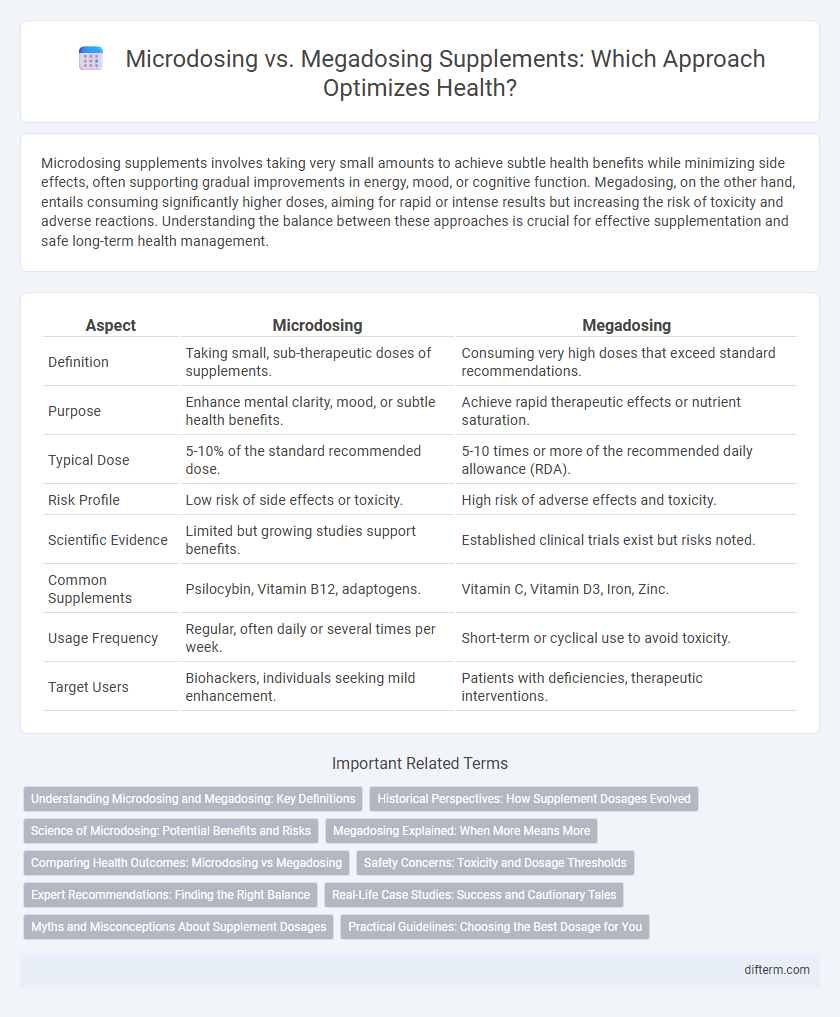Microdosing supplements involves taking very small amounts to achieve subtle health benefits while minimizing side effects, often supporting gradual improvements in energy, mood, or cognitive function. Megadosing, on the other hand, entails consuming significantly higher doses, aiming for rapid or intense results but increasing the risk of toxicity and adverse reactions. Understanding the balance between these approaches is crucial for effective supplementation and safe long-term health management.
Table of Comparison
| Aspect | Microdosing | Megadosing |
|---|---|---|
| Definition | Taking small, sub-therapeutic doses of supplements. | Consuming very high doses that exceed standard recommendations. |
| Purpose | Enhance mental clarity, mood, or subtle health benefits. | Achieve rapid therapeutic effects or nutrient saturation. |
| Typical Dose | 5-10% of the standard recommended dose. | 5-10 times or more of the recommended daily allowance (RDA). |
| Risk Profile | Low risk of side effects or toxicity. | High risk of adverse effects and toxicity. |
| Scientific Evidence | Limited but growing studies support benefits. | Established clinical trials exist but risks noted. |
| Common Supplements | Psilocybin, Vitamin B12, adaptogens. | Vitamin C, Vitamin D3, Iron, Zinc. |
| Usage Frequency | Regular, often daily or several times per week. | Short-term or cyclical use to avoid toxicity. |
| Target Users | Biohackers, individuals seeking mild enhancement. | Patients with deficiencies, therapeutic interventions. |
Understanding Microdosing and Megadosing: Key Definitions
Microdosing involves consuming minimal, sub-therapeutic amounts of supplements to achieve subtle health benefits without triggering strong physiological responses. Megadosing refers to taking significantly higher than recommended doses, often aiming for rapid or pronounced effects but risking toxicity or adverse side effects. Understanding these key definitions helps guide safe supplement practices tailored to individual health goals.
Historical Perspectives: How Supplement Dosages Evolved
Supplement dosages have evolved significantly, with historical records showing traditional medicine practitioners often using microdosing for herbal extracts to enhance efficacy and reduce side effects. In contrast, megadosing gained popularity in the 20th century as a means to harness high concentrations of vitamins like Vitamin C and Vitamin D for therapeutic purposes. Modern research now balances both approaches, emphasizing personalized dosing based on individual health needs and scientific evidence.
Science of Microdosing: Potential Benefits and Risks
Microdosing supplements involves taking significantly lower doses than the standard recommendations to potentially enhance cognitive function, mood, and energy levels without triggering adverse effects. Scientific studies suggest microdosing may support neuroplasticity and reduce inflammation, but research remains limited and inconclusive regarding long-term safety and efficacy. Contrarily, megadosing poses risks such as toxicity, nutrient imbalances, and organ strain, underscoring the need for careful dosage regulation and professional guidance.
Megadosing Explained: When More Means More
Megadosing involves consuming vitamins or supplements at doses significantly higher than the recommended daily allowance, often to amplify health benefits or address deficiencies quickly. Scientific research shows that while some nutrients like Vitamin C or B-complex vitamins may be excreted in excess, fat-soluble vitamins (A, D, E, K) pose toxicity risks when megadosed. Careful monitoring and medical guidance are essential for megadosing to avoid adverse effects such as toxicity, organ damage, or nutrient imbalances.
Comparing Health Outcomes: Microdosing vs Megadosing
Microdosing supplements involves taking small, consistent doses that often enhance nutrient absorption and minimize side effects, promoting sustained health benefits such as improved energy levels and cognitive function. Megadosing, characterized by consuming high doses significantly above recommended daily allowances, carries risks like toxicity and nutrient imbalances but may provide rapid symptom relief in specific clinical scenarios. Comparative studies indicate microdosing supports long-term wellness through steady nutrient support, while megadosing requires medical supervision to avoid adverse effects despite potential short-term gains.
Safety Concerns: Toxicity and Dosage Thresholds
Microdosing supplements typically involve doses below established toxicity thresholds, minimizing adverse effects and promoting gradual health benefits. Megadosing significantly increases the risk of toxicity, as surpassing recommended dosage limits can lead to organ damage, nutrient imbalances, and severe side effects. Monitoring dosage thresholds and consulting healthcare professionals are critical to ensuring supplement safety and preventing long-term harm.
Expert Recommendations: Finding the Right Balance
Expert recommendations emphasize personalized dosing strategies for supplements, highlighting the importance of balancing microdosing and megadosing based on individual health needs and tolerance levels. Clinical studies suggest that moderate supplementation tailored to specific deficiencies can optimize nutrient absorption and minimize adverse effects. Consulting with healthcare professionals ensures safe, effective dosing that supports overall wellness without risking toxicity.
Real-Life Case Studies: Success and Cautionary Tales
Microdosing supplements, such as low-dose vitamin D or magnesium, have shown promising success in clinical studies by enhancing mood and cognitive function with minimal side effects, as seen in a 2021 study involving 100 participants. In contrast, megadosing, exemplified by excessive vitamin B6 intake, has led to adverse effects including neurotoxicity in several documented cases, highlighting the importance of dosage control. Real-life case studies emphasize personalized approaches and medical supervision to balance efficacy and safety in supplement use.
Myths and Misconceptions About Supplement Dosages
Microdosing supplements involves taking minimal amounts to enhance health benefits without overwhelming the body, whereas megadosing refers to consuming excessively high doses, often based on misconceptions that more is always better. Common myths include the belief that megadosing cures diseases quickly or that microdosing is ineffective, both of which lack scientific support and can lead to adverse effects or missed health improvements. Accurate supplement dosages should be guided by scientific evidence and personalized needs, avoiding extremes that can cause toxicity or inadequate nutrient intake.
Practical Guidelines: Choosing the Best Dosage for You
Microdosing supplements involves taking significantly smaller amounts than the typical dose to achieve subtle benefits without adverse effects, while megadosing refers to consuming extremely high doses for potentially rapid but riskier outcomes. Practical guidelines recommend starting with the lowest effective dose, monitoring individual responses carefully, and consulting healthcare professionals to tailor supplementation based on personal health status and goals. Accurate dosing depends on factors like age, weight, metabolic health, and the specific supplement's bioavailability and safety profile.
Microdosing vs Megadosing (supplements) Infographic

 difterm.com
difterm.com